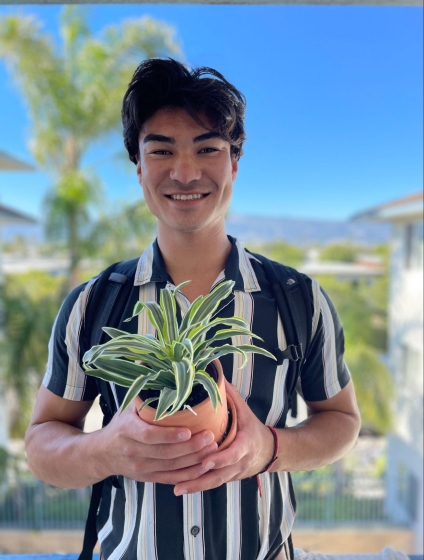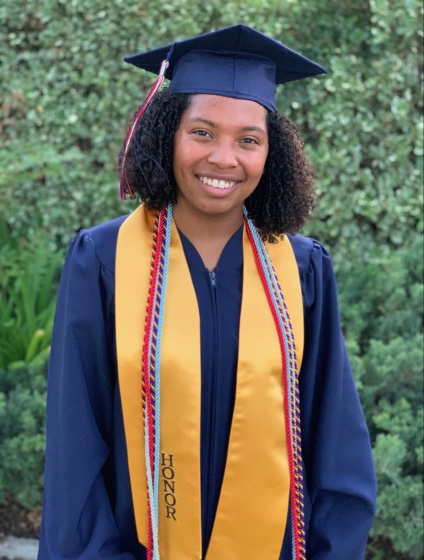The Bren Environmental Leadership (BEL) program offers paid summer fellowships for pairs of undergraduate and graduate students (Bren MESM) to work on environmental science projects. The program includes a wide range of projects each year, including both academic environmental science research and internships with Bren-UCSB partner organizations. The mission of this program is to increase the number of first-generation, low-income, and/or underrepresented students working towards careers in the environmental field and natural sciences. The 10-week intensive summer program provides fellowship support, networking, and training opportunities for BEL Fellows through connection with learning communities, career skills workshops, and presentation opportunities.
Program Details
- Undergraduate students receive direct support from a Bren graduate student mentor, and graduate students gain valuable mentoring and project management experience
- Summer program includes weekly professional development workshops and community building events during summer quarter
- Project teams prepare short, flash-talk style presentations to the BEL community at the end of the summer and are invited to participate in the Mantell Symposium in Environmental Justice and Conservation Innovation in Fall
Notify Me When 2026 Applications Open
Summer 2025 Opportunities
The BEL application pool is now closed for Summer 2025
Applications should include:
- A brief statement (2-3 paragraphs) describing your interest in this project and how your experience and qualifications make you a good fit. We welcome insights into how your experiences or perspectives might shape your contribution to the BEL community.
- A resume or CV, including any relevant coursework and previous experience.
You can apply directly to the projects that interest you. Applicants must be full-time continuing UCSB undergraduate students with at least 2 quarters remaining before graduation at the time of application. The BEL program is open to students from all majors and backgrounds. Check back here for available positions, or keep an eye out on Handshake and campus listservs.

"From technical issues to unforeseen challenges, this summer I encountered a series of obstacles that tested my resilience and adaptability. As the internship progressed, I learned to overcome these hurdles and gained tremendous experience. This program has greatly helped with building my skills needed for graduate school and a future career in research!”
Lucas Lowe, BEL 2023

“I have learned a lot about the research process, made connections in my field, and learned about many different opportunities that I could take part in. I feel as though the direction of my life has become more clear.”
Brynn Campos, BEL 2023
Examples of Past Fellowships
- Coastal Dune Restoration Research: Embark on field surveys at coastal dune restoration sites in southern CA to evaluate the potential of restoration to improve coastal resilience.
- Wildfire Resilience: Conveying Models to Communities through Scientific Communication: Develop an RShiny app (or equivalent tool) to communicate the results of ecohydrological models exploring how climate change and climatology influence fire likelihood, severity, and behavior.
- Satellites and data science to build climate change resilience in Sub-Saharan Africa: Collect and analyze climate, market, and migration data to assess the potential of center pivot irrigation to improve agricultural resilience in Sub-Saharan Africa.
- Determining Groundwater Pollution from Tobacco Product Waste: Collect groundwater samples and use lab extraction techniques to estimate the proportion of microplastics originating from tobacco product waste.
- The Observatory of Environmental Justice in Latin America (The 2035 Initiative): Organize a dataset of public health outcomes in Mexico for localities exposed to mining and oil and pilot a survey about attitudes and responses to extractive industries.
- Policy and Communication for Wildfire Resilience (The 2035 Initiative): Produce policy and communications materials the project's research outputs, implications for communities, and information to guide strategies for effective prescribed burns.
- Evaluating Rapid Response Devices for Island Biosecurity (The Nature Conservancy): Use remote cameras to test devices designed to exclude native species from rat traps on Santa Cruz Island through field experiments on the mainland and on Santa Cruz Island.
- A How-To Guide for Detecting Whales from Space (The Nature Conservancy): Create a technical user guide for using a machine learning whale detection tool to create actionable data on the presence and distribution of whales in VHR satellite imagery.
- Climate resilience planning in Santa Paula (Central Coast Alliance United for a Sustainable Economy - CAUSE): Conduct literature reviews and interact with community members to identify climate resilience measures to address flooding and extreme heat in Santa Paula.
- Developing policies for preserving natural resources in the Bahamas (Community and College Partners Program - C2P2): Research and develop policies to address key environmental challenges in the Bahamas, including limestone mining hazards, marine species extraction, and sustainable development.
- Methods to transform biosolids to eliminate release of PFAS and other contaminants to agricultural areas: Use lab extraction techniques to estimate contamination in soil samples.
Our program partners include:
- The Nature Conservancy (TNC)
- National Oceanic and Atmospheric Administration (NOAA)
- Audubon California
- Ocean Defenders Alliance
- Community and College Partners Program
- Rincon Consultants
Contact:
For questions from students or organizations interested in joining the program, please contact Renae Marshall.